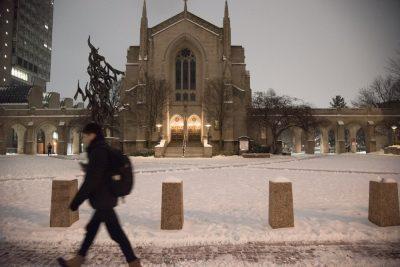
Given the demanding nature of assignments, extracurriculars, jobs and other day-to-day tasks, it can be difficult for students and professors alike to pause and steer their focus from anxiety or stress to their well-being in the present moment. Monday Meditation at Marsh Chapel provides a time and space for anyone to drop in for a brief moment of clarity and calm.
Meditation is an ancient practice of mindfulness dating back over 5,000 years and was first documented in ancient India around 1,500 BCE. Since its inception, the practice has carried spiritual significance across many faiths and is widely practiced today in both a religious and secular sense.
The sessions were initiated by former University Chaplain for International Students Rev. Brittany Longsdorf and run each Monday from 12:15 p.m. to 12:45 p.m.
Jessica Chicka, the current university chaplain for international students and host of Monday Meditation, said while the sessions are not specific to one faith, they are still spiritual.
“I think the benefits are getting in touch with that which is inside yourself, and for some people that is a divine presence, and for some people that’s just getting to know yourself better,” Chicka said. “Either way is fine, and the meditations that we do here are not specifically gauged at one religious tradition but more of a spiritual nature.”
Chicka said the sessions are often composed of students of mixed backgrounds as well as many staff members. Besides the Monday sessions, an hour-long meditation takes place each Friday in Robinson Chapel from 11 a.m. to 12 p.m.
Although mindfulness is very much an individual practice and does not demand a devoted location, Chicka said, having a space for people to come in provides an environmental change that helps draw attention away from the sources of stress.
“Students who have come on a regular basis have found that they are able to focus better, they look forward to this as a time where they know they don’t have to do other things,” she said. “Also, you get to meet other people who come to this, as well, so it’s an opportunity to kind of interact with other people on campus that you might not ever see.”
In addition to these weekly sessions, the university offers a “Zen Meditation” PDP led by Mark Houghton, who has practiced meditation for more than 35 years and taught at BU for more than 10.
Learning meditation is very different than the ways most people learn academically, Houghton said. He explained meditation is wisdom-based as opposed to knowledge-based learning, which is present in most university classes where the peak of students’ knowledge is packed into a course and at risk for being forgotten the moment after the final exam.
“Knowledge-based is predicated on accumulating understanding. Wisdom-based has to do with digesting your understanding and arriving at an insight,” Houghton said. “There’s a steady growth curve for years after. It’s a whole different way to kind of approach the process of self-actualizing the human being.”
Mindfulness can manifest in many forms and, apart from seated meditation, is commonly accomplished through yoga. Kelsey Brown, a freshman in the College of Arts and Sciences, said yoga practice is a crucial method of inward clarity and self-healing for her that is a go-to when feeling stress or concern.
“[Yoga] really healed me because I was really distressed about tearing my ACLs — I thought I was going to be a collegiate soccer player,” Brown said. “When that happened junior year, that was recruitment year. Yoga was my saving grace, and with meditation and talking about it, it really helped.”
Brown is among many who have healed through the practice of mindfulness and embrace it for the cultivation of a long-term well-being. Houghton, who said he began meditating while in college, credits the practice for greatly impacting his life in many respects.
“I was pretty much adrift, and it helped me get some insight and some clarity about what to do with my life just through the process of being still and what I was doing and how I was addressing things,” Houghton said. “The reason I teach the course is only because I don’t know anything that’s more valuable.”
















































































































